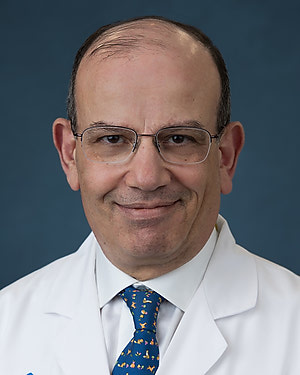Research Lab Results
-
The Halushka Lab
The Halushka laboratory is interested in the overarching question of expression localization in tissues. To address this, the laboratory has set out upon several avenues of discovery in the areas of microRNA expression, proteomics and tissue gene expression. Many of these queries relate to the cardiovascular field as Dr. Halushka is a cardiovascular pathologist. Come learn about the science being done in the laboratory. -
Michael Caterina Lab
The Caterina lab is focused on dissecting mechanisms underlying acute and chronic pain sensation. We use a wide range of approaches, including mouse genetics, imaging, electrophysiology, behavior, cell culture, biochemistry and neuroanatomy to tease apart the molecular and cellular contributors to pathological pain sensation. A few of the current projects in the lab focus on defining the roles of specific subpopulations of neuronal and non-neuronal cells to pain sensation, defining the role of RNA binding proteins in the development and maintenance of neuropathic pain, and understanding how rare skin diseases known as palmoplantar keratodermas lead to severe pain in the hands and feet.
-
Mohamed Atta Lab
Dr. Atta and his research team explore the epidemiological and clinical interventions of a variety of kidney diseases. Our goal is not only to advance the understanding of many kidney diseases but also to capitalize on novel discoveries of basic science to treat a wide range of rare and common kidney disorders.
- Multi-international observational study of a rare form of amyloid (LECT2 amyloid) to understand its natural history with the ultimate interest of treating this condition.
- Our group has launched a project investigating the impact of COVID19 on the kidney to identify risk factors influencing outcome across different clinical phenotypes
- In collaboration with the Division of Infectious Diseases and the School of Public Health, our research has focused on the epidemiology of HIV and kidney disease. We also study clinical markers and contributing factors in the progression of kidney disease, and the association between kidney disease and heart disease.
- Our research group is participating in a multicenter consortium serving as a clinical core site to study the pathogenesis of HIV-associated kidney disease by providing well-characterized clinical specimens and corresponding clinical and laboratory data.

-
Mary Fissell Lab
Research in the Mary Fissell Lab looks at the ways in which average people in early modern England understood health, healing and the natural world. In an ongoing study of vernacular knowledge (ideas about the natural world that ordinary people created, shaped and used), we are examining the popular medical book Aristotle's Masterpiece, first published in 1684. Research has also focused on health care for the poor in 18th-century urban Britain and on how ordinary people learned about their bodies from inexpensive print publications.
-
Machine Biointerface Lab
Dr. Fridman's research group invents and develops bioelectronics for Neuroengineering and Medical Instrumentation applications. We develop innovative medical technology and we also conduct the necessary biological studies to understand how the technology could be effective and safe for people. Our lab is currently focused on developing the ""Safe Direct Current Stimulation"" technology, or SDCS. Unlike the currently available commercial neural prosthetic devices, such as cochlear implants, pacemakers, or Parkinson's deep brain stimulators that can only excite neurons, SDCS can excite, inhibit, and even sensitize them to input. This new technology opens a door to a wide range of applications that we are currently exploring along with device development: e.g. peripheral nerve stimulation for suppressing neuropathic pain, vestibular nerve stimulation to correct balance disorders, vagal nerve stimulation to suppress an asthma attack, and a host of other neuroprosthetic applications. Medical Instrumentation MouthLab is a ""tricorder"" device that we invented here in the Machine Biointerface Lab. The device currently obtains all vital signs within 60s: Pulse rate, breathing rate, temperature, blood pressure, blood oxygen saturation, electrocardiogram, and FEV1 (lung function) measurement. Because the device is in the mouth, it has access to saliva and to breath and we are focused now on expanding its capability to obtaining measures of dehydration and biomarkers that could be indicative of a wide range of internal disorders ranging from stress to kidney failure and even lung cancer. -
Mahendra Damarla Lab
Work in the Mahendra Damarla Lab focuses primarily on the field of vascular biology. Much of our research involves exploring alternatives to mechanical ventilation as a therapy for acute lung injury. We investigate mitogen-activated protein kinase-activated protein kinase 2 as a method to mediate apoptosis during lung vascular permeability by regulating movement of cleaved caspase 3. We have also conducted research on the prevalence of confirmatory tests in patients hospitalized with congestive heart failure or chronic obstructive pulmonary disease (COPD).
-
Michael A. Rosen Lab
Research in the Michael A. Rosen Lab primarily focuses on patient safety and simulation-based health care training and technology. Recent work provided examples of how human factors experts can collaborate with health care professionals and simulationists (experts in the design and implementation of simulation) to use contemporary simulation to improve health care delivery. Another recent study examined the anesthesia practice at two tertiary care hospitals in Sierra Leone, West Africa, where anesthesia is associated with high mortality rates. We identified gaps in the application of internationally recommended anesthesia practices at both hospitals, likely caused by lack of available resources.
-
Timothy Niessen Lab
The Timothy Niessen Lab studies patient outcomes in the ICU. We are particularly interested in the effects of sleep quality, delirium transitions and sedation on the improvement of intensive care patients. Our investigators also focus on the practices of internal medicine interns, studying the variability of hand washing hygiene, etiquette-based communication and time spent in direct and indirect patient care. We have also studied the onset of myelopathy as a result of B12 deficiency from long-term colchicine treatment and recreational nitrous oxide use.
-
Thomas W. Donner Lab
The Thomas W. Donner Lab focuses on type 1 and type 2 diabetes, with an emphasis on the prevention of complications in patients with these conditions. We’re currently collaborating with Dr. Abdel Hamad to inhibit B-regulatory cell apoptosis through a novel monoclonal antibody that targets the probable apoptotic factor. We also lead a multi-center, international consortium of researchers studying ways to prevent type 1 diabetes and preserve insulin secretion in people who have been recently diagnosed with the chronic condition.
-
The Laboratory for Precision Immunology
We are devoted to developing and deploying cutting edge technologies that can be used to define human immune responses. Much of our work leverages ‘next generation’ DNA sequencing, which enables massively parallel molecular measurements. Examples of our technologies include: - bacteriophage display of synthetic peptidome libraries for comprehensive, quantitative profiling of antibodies; - display of ORFeome libraries for antigen discovery, protein-protein interaction studies, and drug target identification; - ultrasensitive, multiplex RNA quantification techniques to monitor gene expression and detect microbes; - pooled genetic screening to elucidate immune cell function and identify new therapeutic targets. The Larman Laboratory uses these and other approaches to identify opportunities for monitoring and manipulating immune responses.


